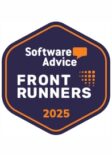Host: Hello everyone, and welcome back to another episode of ExtraMile by KnowledgeNile, where we uncover the stories, strategies, and secrets behind some of the most innovative companies and the leaders driving them forward.
I am your host, Sayali, and today we are thrilled to welcome Didi Azaria, CEO of Workiz, a fast-growing field service platform that supports over 120,000-plus service professionals in streamlining their operations.
Didi's journey is truly inspiring, from co-founding the BI unicorn Sisense to now leading a mission-driven tech company that's transforming the day-to-day work of technicians, with solutions ranging from AI-powered scheduling to seamless payments. Workiz is helping service pros focus on what they do best while letting technology handle the rest.
Welcome Didi, great to have you here.
Didi: Thank you so much for having me.
Host: So Didi, Workiz began with few frustrated locksmiths. How did this grassroots beginning shape the company's mission to now serve over 120,000 field service professionals?
Didi: A great question, thank you. So, me and my partner, we were locksmiths separately. I was a locksmith in L.A. like 25 years ago. I was a technician. He, Dan, was a locksmith in San Diego about 10-15 years later. He created an amazing business across the entire West Coast.
But we both felt the same challenging way of handling customers, communications and so on. In my old days, we didn't have any cell phones, so you had to get off your track, go to a payphone and call the client and hope that they will be home because, again, no cell phones. Even GPS wasn't around back in the days.
Dan, on the other hand, was living in a more of a technological era where cell phones exist, GPS exists. And much of the marketing was shifting more towards Google and other web platforms. Dan created an empire.And meanwhile, when I was failing as a technician, more towards being an entrepreneur in the business intelligence world. Together with some of my friends, I co-founded a company called Sisense, which is now one of the leading BI companies in the world. 13 years later, Dan came to my office at Sisense and asked for help.
I'm not going to take you through the entire story, but we fell in love. And since then, seven years, we are together. Workiz was created in order to solve a lot of the challenges that we faced, from asking the client if they're going to be home, when we're going to be there, down to asking them to pay online instead of taking cash checks and so on.
A lot of the digital solutions that Workiz provide today would consider it to be automations. So in simple words, we take all the challenges of field services in North America. And our mission is simply to automate everything other than the ranch. And that's what we do at Workiz.
Host: That's incredible. Thank you so much for sharing that with us. But this leads me to the platform helps service pros focus on their craft while tech handles the rest. So, can you share a real world example of how Workiz transformed a small business operation?
Didi: Absolutely. A small business operation, specifically in the service industry, would be somebody that goes out of the office to a client's location, do the work, and taking payments, going back and so on. What Workiz does for them from A to Z, meaning the Workiz platform grabs any lead with requests.
This could be a lead that asks for information or for a quote. The system immediately engages in a conversation automatically or not, depends on the owner, convincing the client for a free estimate, etc. That's the first action that we do.
In many cases, those businesses are small and they don't get back to the client in a timely manner or don't get back at all. The Workiz reduces that friction. Next, we will confirm the availability of the owner and the technician or the client and the technician.
This again, it saves a lot of time for a back office persona to schedule, to look into the schedule and so on. Once the meeting is booked, the system is taking care of two hours before, one day before, hey, you should be home. We're going to be there.
You will be amazed how many times I was driving to a client and they were not there and then too. It saves them a lot of time. At the client location, we give the technician all the information in order how to get into the house, what needs to be fixed. An estimate is being produced. The client signs the estimate. We do the job.
They do the job and payment is being served. This is done also by the system. And if the client haven't paid on site, the system reminds them until they are paid. This is just a few examples of how we took a lot of manual work from a service business, allowing them to focus on their craft, which is fixing a lock, replacing an AC unit and so on.
Host: Speaking of tech, your AI answering system, Jessica, manages bookings, speaks Spanish and automates calls. So how do you balance automation with the human touch that field service businesses thrive on?
Didi: It is a very good question. It's all about trust and confidence, meaning if the owner is trusting the system to do a job that is good enough or better than his office employees, they will switch to Jessica. In most cases, Jessica is taking care of what we call late hours.
When people are going home at 5 p.m., guess what? Customers are going also home from their jobs and to find what? To find broken appliances, AC or whatever. This is the time that they need the service business most. So what do they do? They call.
Nobody answers. That's when Jessica kicks in and provides the best results because she answers all the time, 24/7 if you want. She's going to provide the right schedule, and the technician will arrive to the destination even if the owner is not at your office.
So Jessica, best use cases for late hours. Many people, to be honest, are using it 24/7 because she's just there all the time.
Host: If we talk about competition, while many FSM platforms focus on enterprises, Workiz serves SMEs. So what's your strategy to help smaller businesses compete and win against larger players?
Didi: The best strategy is to create value. The best value created is growth without adding headcount or without changing pricing. This is my motto. It has always been. Meaning, if I can create a system that will drive enough growth, the small business will survive. I'm not sure if you know, but around 70% of the small businesses in the United States are not going to survive the first five years.
That's an enormous number. And our goal as a business is to help those SMBs to survive these first five years. How do we do that? We provide a semi-automated or automated system to handle all the stuff that they are not liking to do. The end result, by the way, is staggering. We are providing around 38% growth year over year for a business before and after they implement the Workiz's platform and our recommendations.
Just imagine 40% more revenue out of doing the same amount of employees, same pricing. And once we do that, we help the surviving rates by a lot. And we believe that SMBs are the backbone of the industry at any anywhere in the world, not just North America, but specifically North America. Most businesses are small and medium.
Host: Now talking about your journey, after co-founding Sisense, what drove you to Workiz? How has your background in analytics shaped Workiz's data-driven approach?
Didi: So most of our employees in their entry interview, they ask this question, why are you here? It's a very good question in my eyes. I'm here because I see a great opportunity, two great opportunities.
The first one and the most important because I was the field service personnel. I believe that if we can help this market to thrive, that's by definition why I'm doing tech. The next reason would be while business intelligence is a great market, field service is a huge market, much bigger than most markets in the world.
Just to give you an example, the HVAC industry in the United States is transacting around $1 trillion in one year. This is one year transactions. And of course it's related to salaries, cars, whatever. That's how big is one segment in an ever-growing industry. It's warmer everywhere. It's cooler everywhere. Everybody needs more air conditioning and obviously HVAC is thriving through global warming. Workiz is there to help them to optimize their technicians.
Host: Now let's talk about partnerships. From same-day payouts with Chase Bank to integrations with Zoom, how do you choose your partners? And what's next for Workiz's growing ecosystem?
Didi: In general, we always look at what I would call a completing solution, stuff that we will never do. The Workiz have many embedded features to help our customers, whether it's an embedded phone system, which is patented, our customers to create an entire communication there between themselves and their customers internally in the office and so on. We usually look at what our customers require. We listen to them. It's a constant listening feedback loop, right? What is the HVAC persona needs?
What is the locksmith persona needs? And once many of them need the same things, which we are not going to create, obviously we're going to partner with such a company where some great partners all around. One of the best examples is Google Local Services. We are advertising. So whenever a lead gets into the system, Google pushes it into the Workiz system. The system kicks in the conversation almost automatically. And we all know how important it is, first reaction and fast reaction. So we pick the right partner and we accelerate our client interactions and obviously the revenue.
Host: So Workiz has grown rapidly while staying customer obsessed. What's one lesson you have learned about preserving company's culture during the hyper growth?
Didi: To talk about problems, I'm calling it glorious failures. Glorious failures are always about talking about my mistakes to start with and then giving other employees the ability to speak about mistakes and what we've learned from them. I don't think there is success without failures and it's not a cliche. I think we need to try. And if you haven't failed, it just meant that you did not try enough.
Host: Now coming to our last segment, Workiz helps service pros retire on their own terms. So hypothetically, if you retire tomorrow, what's next for Didi Azaria? Surfing, mentoring or building another startup?
Didi: The question that my wife asks me all the time. I don't have a clear answer. I don't know this answer. I let life lead me. But at the same time, I'm doing a lot of music. I'm doing a lot of art. I'm helping many startups to avoid my mistakes. I'm investing in many startups. So what the future comes, I don't know. I'm enjoying the present to be honest.
Host: Didi, this has been an incredibly insightful conversation for us. Thank you so much for sharing both the Workiz journey and your personal experience with us. Once again, thank you so much.
Didi: Thank you. It's been a great pleasure.
Host: Thank you everyone for joining us today. I am your host Sayali signing off. See you soon in the next episode of ExtraMile by KnowledgeNile with our next extraordinary leader on board sharing their thoughts and knowledge. Stay curious. Stay tuned.
Tune Into Our Other Informative Interviews:










